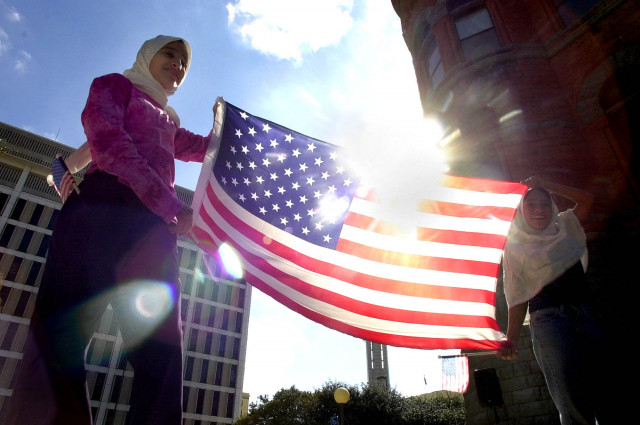US companies work towards accommodating Muslims for Ramazan
Various US companies including Cisco, Apple, Google and Oracle are organising iftars for their Muslim employees

PHOTO: CROSSMAP
At such an event held in June at the GE Global Research Niskayuna’s NY campus, the company facilitated both its Muslim and non-Muslim employees by including a Ramazan quiz, an Eidul Fitr commemoration slideshow and a Pakistani and Mediterranean buffet dinner.
At an event held at the GE Global Research Niskayuna, NY campus earlier this month, the company facilitated both its Muslim and non-Muslim employees by including a Ramazan quiz, an Eidul Fitr commemoration slideshow and a Pakistani and Mediterranean buffet dinner.
“It is an extremely popular event, with the 300 spots being filled within four hours of opening registration,” said Todd Alhart, GE Global Research’s director of media relations.
Read: Google launches website dedicated to Ramazan
Each year, said Alhart, the event is organized around a theme that is core to Ramazan and one that is core to GE. This year’s themes were volunteering and charitable giving and the keynote speech was delivered by the director of a local Christian charity that helps shelter and feed families. The interfaith event raised $1,700 plus matching GE funds.
While GE is going the extra mile to accommodate the religious needs of their Muslim workers, it is not the only company to do so.
American Airlines’ Fort Worth, Texas, headquarters holds a special dinner organised by its Muslim Business Employee Resource Group every year during or soon after Ramazan, attended by Muslim and non-Muslim employees, said Aftab Siddiqui, a scheduler for the airline, who retired in 2012 but continues to attend the annual dinners.
The airline also provides prayer rooms to be used by Muslims on a daily basis, especially during the month of Ramazan. It also offers floating holidays for employees so they can take days off during Eid.
Cisco Systems, Apple, Google and Oracle have all held iftars, for Muslim employees as well.
“We’ve noticed an uptick in the number of companies that are acknowledging Ramazan and exploring possible accommodations for employees who are observing the holiday,” said Rev. Mark Fowler, managing director of programs for the Tanenbaum Center for Interreligious Understanding.
A 2013 survey by Tanenbaum and Public Religion Research Institute on American workers and religion documents an American reality: One-half of American workers have contact with people from diverse beliefs and identities at work.
More than one-third of workers say they’ve personally experienced or witnessed some form of religious non-accommodation in their workplace — from having to work on the Sabbath or a religious holiday to attending company events without kosher, halal, or vegetarian options.
More than half of workers believe there’s a lot of discrimination against Muslims, based either on what they’ve read about, witnessed or experienced in the workplace.
Title VII of the Civil Rights Act of 1964 prohibits employment discrimination based on religion. This includes refusing to accommodate an employee’s sincerely held religious beliefs or practices unless the accommodation would impose an undue hardship.
Read: 15 types of food and drinks that will help Pakistanis get through this hot Ramazan
As US companies grapple with religious accommodation requests, a growing number of businesses are finding creative ways to work with their employees.
Many businesses are already offering halal, kosher and vegetarian options at company luncheons or conferences and adjusting break periods to allow for prayer. And he said that “more and more” companies are creating quiet rooms, sometimes called serenity rooms, for prayer or contemplation.
“Ramazan becomes one example, one touch point for an entire year, when there’s an opportunity to educate about the tradition, educate about the needs of workers, but also to consider what are some of the needs of clients and customers during this time,” Fowler said.
This article originally appeared in The Washington Post.



















COMMENTS
Comments are moderated and generally will be posted if they are on-topic and not abusive.
For more information, please see our Comments FAQ